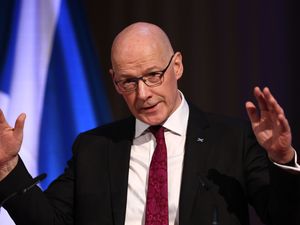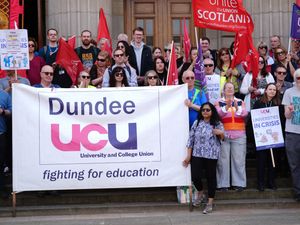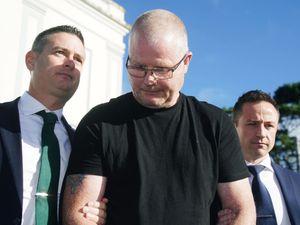Swinney taking ‘nothing for granted’ on Budget despite Labour plans to abstain
The First Minister said the announcement Labour MSPs will abstain in Budget votes made him ‘more confident’ the proposals will pass.

John Swinney has insisted he is not taking it for granted that his government’s Budget will be passed by Holyrood – although the First Minister said Labour’s announcement that it would not vote against it meant he is “more confident” the tax and spending plans for next year will be approved.
Scottish Labour leader Anas Sarwar confirmed on Tuesday his party would abstain when the budget comes before Holyrood for key votes next month – though he added Labour MSPs would vote for it if the Scottish Government ends the two-child cap on some benefits in April this year.
The Scottish Budget proposes to effectively scrap the benefit cap – which means parents can only claim some benefits for their first two children, with no payments made for any subsequent additions to their family – by mitigating the policy north of the border.
But Mr Swinney insisted such a change “practically cannot be done” by this April.

The SNP leader told BBC Radio Scotland’s Good Morning Scotland programme the government would seek to make the change “as fast as we can”, with the First Minister adding: “If we can do it earlier than April 2026 we will do so.”
But he said ministers had to make the financial provision for the policy – which experts have said will cost £155 million in 2026-27 before rising to £198 million by 2029-30 – as well as put the necessary systems in place for the change.
Mr Swinney said: “I would love to be able to lift the two-child limit in April of this year. I would love it more than anything else, because it would help me on my agenda of eradicating child poverty.
“But I have got to put in place the practical steps to make that possible, which involves dialogue with His Majesty’s Revenue and Customs, the Department of Work and Pensions.
“But I can’t mislead people by the suggestion that I can do something quicker. And Anas Sarwar knows this can’t be done by April of this year. He knows that.”
The plan to scrap the two-child cap introduced by the Tories when they were in power at Westminster was the headline announcement in December’s draft Scottish Budget.

But with the SNP lacking a majority at Holyrood its passage is not guaranteed – though Mr Sarwar’s announcement on Tuesday that Labour will abstain makes it almost certain the Budget will go through.
Mr Swinney, a former Holyrood finance secretary, recalled however that in 2009 MSPs had initially voted against a budget he had put forward.
And the First Minister said: “I take nothing for granted because I’ve sat in Parliament and heard the Presiding Officer read out voting numbers, which resulted in one of my budgets not passing.”
While he said Labour plans to abstain made him “more confident”, he also insisted talks would continue with other opposition parties in the Scottish Parliament.
Mr Swinney said: “I want to continue those discussions, and I want to try to find the basis of getting as much agreement as possible around the government’s budget provisions so that we can make progress on behalf of all of the people of Scotland.”
Adding that he wanted to “maximise agreement around the Budget”, the First Minister said he was “deadly serious” about his goal of trying to “bring people together”.
He said: “I think if anything is required in politics today, (it) is a bringing together of people and a focus on the addressing of the concerns and the priorities of people in our country.
“Because people in our country are anxious, they’re worried about their circumstances, and they want politicians and political leaders to work together.”





